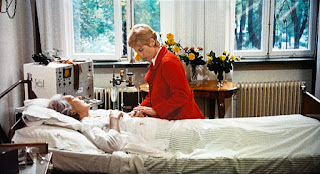Love Story, or: The Fabric of Our Lives

Karin's (Bibi Andersson's) mother lies dead in a hospital bed with windows exposing the traffic of the outside world, a small but chic town on Gotland called Visby. (Unnamed in the film, but explicitly referred to in Stig Björkman's excellent 55-minute documentary from 1972 on the making of the film, Ingmar Bergman.) A more humane hospital setting would be anathema in the United States health-care system. The wedding rings handed over to her by the nurse from the deceased mother set a charge that inflects the rest of the film, a tale of Karin's affair with a Jewish-American archaeologist named David Kovacs (Elliott Gould, who commands lead billing due to the chauvinism of the time and his post-M*A*S*H bankability) behind the back, for only so long, of her husband of 15 years Andreas (Max von Sydow). The meet-cute occurs at a dinner party that takes place some time after Andreas was in the acquaintance of David after treating him from an attempted suicide by gas oven, which David, all mixed-up and bipolar, the majority of his family having been wiped out in the camps, now denies. The Touch [1971] is an undersung masterpiece, Bibi Andersson's finest performance up to this point. Eventually the affair will come to chip away at itself, much like the 500-year-dormant insects whose larvae have sprung to hatching following the unearthing of a wooden sculpture of the Madonna and child.
As Karan Mahajan writes in the essay accompanying Criterion's Ingmar Bergman's Cinema set: "When Karin vacuums and stows away laundry in her bright house, the filmmaker throws in a hilarious ad jingle to italicize the moment — a wink, perhaps, to the fact that he first met Andersson while filming a soap commercial." That she should be so enamored with this near sociopath speaks to another point made by Mahajan: the English language 34-year-old Karin uses (beautifully — though she tellingly can't remember the word "hearth") allows her to create a 'second self,' as we've seen so often in Bergman in the previous decade. David's English, on the other hand, is overly arch; he uses phrases like "Have you..." as opposed to "Do you have..." and "mustn't" instead of "have to." He's quite secure in himself, despite being a pretentious ass. Andreas is secure in a different way, blinkered and ignorant and too tolerant; he professes not to have even noticed that at their dinner party David has had too much to drink despite having requested during a projected slide-show that he'd like to see some photos of Karin in the nude.
Some words about David: pajamas were a big thing for men before the 1990s, and he has no compunction about greeting his lover either on, or appearing to have been on, a bender. One might infer much about David's childish clinging-ons and general behavior. His family album contains photos of his family, including his own mother, in contrast Karin's: the photograph is of Bergman's own mother, whose name was Karin. In the final scene David hollers at Karin: "I know you're lying. — I know you're lying, do you hear!" About what? The dissolution of the relationship? That her child in the womb is his, and not Andreas's? She drops her language books — she's been taking Italian classes, and perhaps a third persona, or a wall of uncommunication, is ready to erupt. Throughout the film, the word "touching" is used again and again, as though there's some confusion in the very title of the film The Touch.
The musical piece that plays on occasion throughout the film is
"Liksom en herdinna" [
"Like a Shepherdess"] by Jan Johansson.
•



























===
Other writing on Ingmar Bergman at Cinemasparagus:
Kris [Crisis, 1946]
Skepp till India Land [Ship to India, 1947]
Hamnstad [Port of Call, 1948]
Törst [Thirst, 1949]
Till glädje [To Joy, 1950]
Sommarlek [Summer Interlude, 1951]
Kvinnors väntan [Women's Waiting, 1952]
Sommaren med Monika [Summer with Monika, 1953]
Gycklarnas afton [Carnies' Twilight, aka Sawdust and Tinsel, 1954]
En lektion i kärlek [A Lesson in Love, 1954]
Kvinnodröm [Women's Dream, aka Dreams, 1955]
Sommernattens leende [Smile of the Summer Night, 1955]
Det sjunde inseglet [The Seventh Seal, 1957]
Smultronstället [The Wild Strawberry Patch, aka Wild Strawberries, 1957]
Nära livet [On the Brink of Life, aka Brink of Life, 1958]
Ansiktet [The Face, aka The Magician, 1958]
Jungfrukällan [The Virgin Spring, 1960]
Djävulens öge [The Devil's Eye, 1960]
Såsom i en spegel [As in a Mirror / Through a Glass Darkly, 1961]
Nattvardsgästerna [The Communicants, aka Winter Light, 1962]
Tystnaden [The Silence, 1963]
För att inte tala om alla dessa kvinnor [Not to Mention All These Women, 1964]
Persona [1966]
Vargtimmen [The Hour of the Wolf, 1968]
Skammen [Shame, 1968]
===




























No comments:
Post a Comment
Note: Only a member of this blog may post a comment.